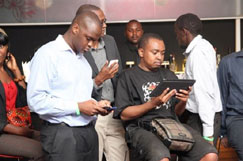Media
Social media 'integral' to SA students' lives
Facebook first, then Twitter
Facebook was the universal social destination for students, with 96% of respondents using it, with Twitter used by 70% of respondents. Google+ slotted into third place, at 47%, thanks to the pervasive use of Google Apps for student accounts at universities. Mxit still retained a strong user base, with 39% of respondents reporting they used it. LinkedIn, the professional network, claimed a 29% share, largely students who are nearing completion of their studies and using it for employment prospects. Instagram and Pinterest, relative newcomers to the social networking environment, attracted 16% and 15% of respondents respectively. When asked which network they would use if they could only choose one, two-thirds (64%) still cited Facebook. Twitter was in distant second at 16%, followed by Google+ with 7%, Instagram 5%, Mxit 3% and LinkedIn 3%. Only 1% favoured Pinterest.Instant messaging
Among instant messaging (IM) apps, similar levels of dominance were seen, this time led by WhatsApp, which was used by 79% of students participating in the survey, and BBM, at 57%. Facebook Messenger claimed 45%, and Mxit 28%. BBM use was directly correlated with the proportion of students who used BlackBerry: 57%. Despite its fading popularity worldwide, it remained the preferred phone among students. Nokia was in a distant second place, at only 20%, with Samsung further back in third place, at 14%, and the iPhone fourth at 5%. Among other findings, the survey found that 68% of students connected to the internet via smartphones, 61% via laptops or notebook computers, 50% on desktop PCs - largely using universities' and colleges' machines - and 20% on tablets. This trend was driven by some institutions providing laptops and tablets to students, and low-cost financing of devices by student financial services like Eduloan.Campus wi-fi set to rule
In terms of channel of access, 60% used wi-fi on campus, 40% used 3G modems, and 39% used mobile data on their phones. However, a total shift to wi-fi is expected in the next two years. "By 2015, all universities are required to be wireless, providing free internet access for students," Bartkunsky said. "Already, the University of Johannesburg, Pretoria and Cape Town have stated that all first-year students will have to have a tablet or laptop by 2015." World Wide Worx MD Arthur Goldstuck pointed out that the cost of mobile data was a major inhibitor for students. "A little more than a third of respondents were happy with what they pay for internet access," Goldstuck said. 'But 31% are unhappy with the cost and 30% don't pay at all. For students, the move away from mobile data services is a matter of when, not if." World Wide Worx and SAinfo reporter
Developers at a Microsoft DEV Camp in Kenya. The camps are part of Microsoft's 4Afrika Initiative, which aims, among other things, to help an additional 100 000 recent graduates develop employability skills (Photo: Microsoft 4Afrika)
Related articles
- Telkom speeds up South Africa's ADSL
- SA 5th in Africa for internet access
- Piloting 'white space' broadband in SA
- Free tablets, wi-fi for Gauteng schools
- South Africa edges up ICT rankings
- Tech hub to grow African entrepreneurs
- SA operating system for smartphones
- Broadband doubles as SA shifts to mobile
- 'Be careful what you share online'
- Corporate SA 'wakes up to social media'
- Social media 'breaking barriers' in SA
- SA mobile content start-up goes global
- SA leads Africa's growing Twittersphere
- ICT 'to drive African economic growth'
- South Africans embrace social media


